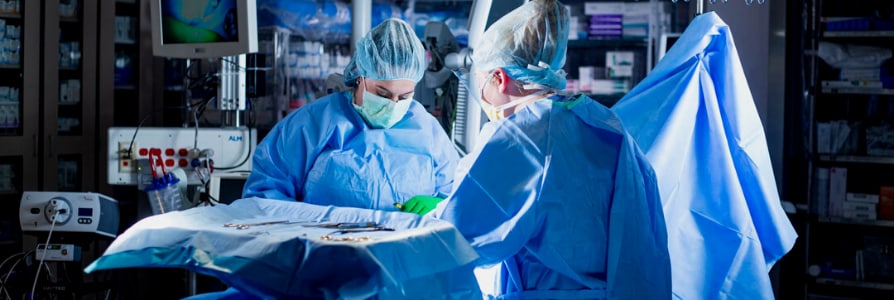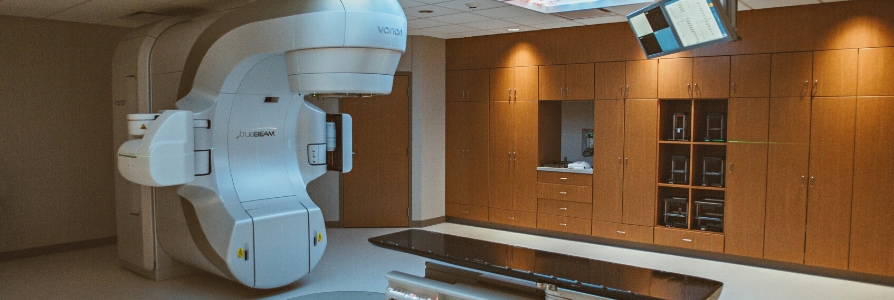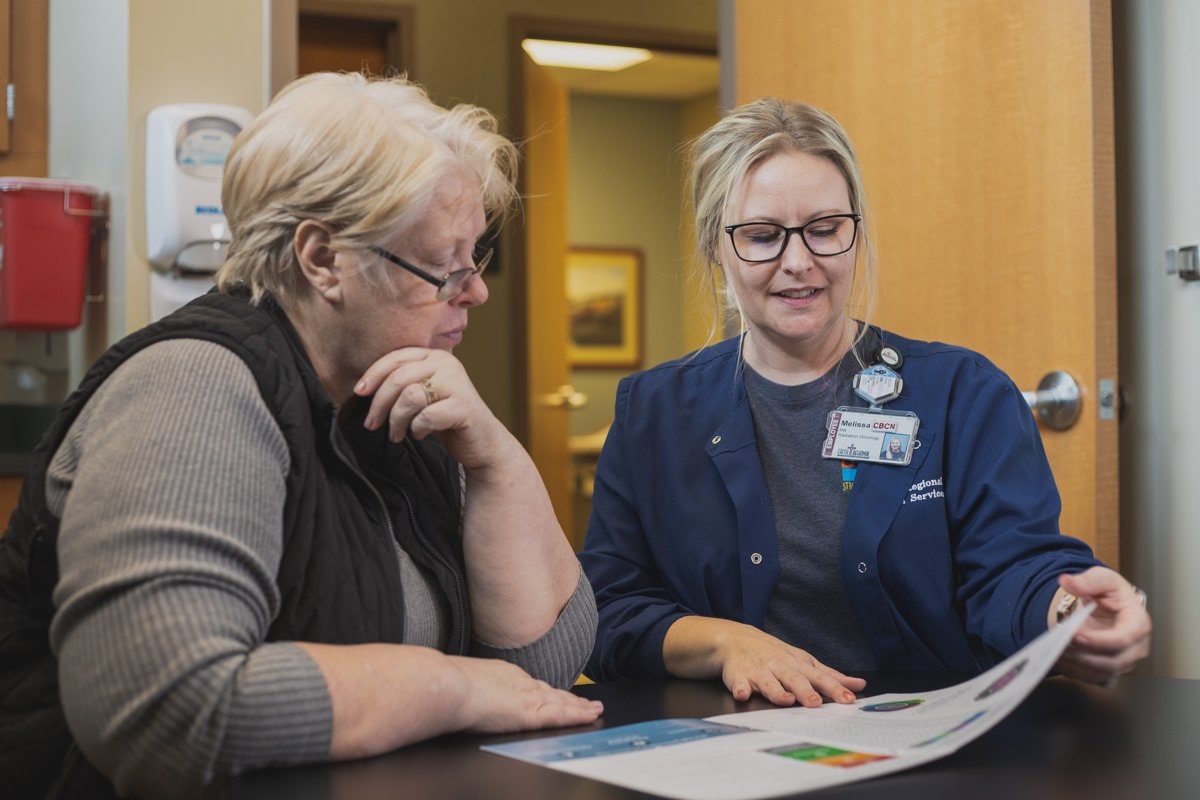Breast Health

One in eight women in the U.S. will be diagnosed with breast cancer in their lifetime. Our team of highly trained experts combines cutting-edge medicine and compassion to care for your breast health here in northeast Nebraska at Faith Regional Health Services.
Get Screened
Treatments work best when breast cancer is caught early. We encourage you to talk to your primary care provider about when to get a baseline screening and how often you should have screening mammograms. All screening mammograms at Faith Regional are double-read by board-certified radiologists. Diagnostic breast exams offered at Faith Regional include:
Mammograms
Both 2D and 3D mammograms are available at Faith Regional. The two types of mammograms are similar in that the technologist will position you, compress your breast, and take images from different angles. The difference between the two types of exams is that the 3D technology allows providers to examine your breast tissue layer by layer. Fine details are more visible and no longer hidden by the tissue above or below. 3D mammograms detect 41% more invasive breast cancers and reduce false positives by up to 40%.
Breast Ultrasound
Sound waves are used to produce pictures of your breasts. Your doctor may recommend a breast ultrasound to help diagnose breast lumps or other abnormalities identified during a physical exam, mammogram, or breast MRI.
Breast MRI
Detailed pictures of your breast structure are captured using a powerful magnetic field and radio waves.
Biopsy
Your doctor will remove cells from your breast to be looked at in the lab to see if cancer cells are present. The biopsy can be done using a needle or an incision.
Know the Signs and Symptoms of Breast Cancer
It’s just as important to know the signs or symptoms of breast cancer, as well as the different types. Be on the lookout and speak up if you notice any changes to the look or feel of your breasts, such as:
- A lump or thickening in or near your breast or in your underarm area.
- A change in the size or shape of your breast.
- A dimple or puckering in the skin of your breast.
- A nipple that has turned inward or a sore near your nipple.
- Fluid, other than breast milk, leaking from your nipple, especially if the fluid is bloody or leaks from only one breast.
- Skin irritation or changes – such as puckering, dimpling, scaliness, or new creases – anywhere on your breast, nipple, or areola (the dark area of skin around the nipple).
- Dimples in your breast that look like the skin of an orange.
- Pain in your breast, especially if the pain doesn’t go away.
Assessing Your Genetic Risks for Breast Cancer
Some risks for breast cancer are tied to your genetic makeup. Faith Regional offers genetic counseling and testing to assess your risk for breast cancer. While genetic testing can be helpful in some cases, not everyone needs to be tested and each person should carefully consider the benefits and disadvantages of genetic testing. Our breast surgeon can assess your familial risks and help you weigh the pros and cons to determine if genetic testing is right for you.
Getting the Right Treatment
If you are diagnosed with breast cancer, our highly trained team of oncologists and breast surgeons will work together with you to create an individualized treatment plan. Your treatment may include:
Hidden Scar
With a Hidden Scar breast cancer surgery, our breast surgical oncologist and plastic and reconstructive surgeon will place your incision in a location that is hard to see so that the scar is not visible when your incision heals. As a result, you will have little to no reminder of the surgery or your cancer. While Hidden Scar can be performed for both a lumpectomy and a mastectomy, not everyone may be a candidate due to the location and size of their tumor. You and your surgeon will determine if Hidden Scar is the best choice for you.
Lumpectomy
Your surgeon will create an incision to remove the tumor and some of the surrounding tissue. Most of your breast will be spared, including your nipple and most of your skin. Your surgeon will attempt to hide the incision so your scar will not be visible when your incision heals. You and your surgeon will determine if a lumpectomy is the best choice for you.
Mastectomy
Your surgeon removes the breast cancer tumor by removing all of your breast tissue. There are five different types of mastectomy. You and your surgeon will determine if a mastectomy is the best choice for you.
Lymph Node Removal
Your surgeon will remove some of your lymph nodes under your arm during your lumpectomy or mastectomy.
Radiation Therapy
Highly targeted radiation therapy is delivered directly towards cancer cells. This treatment will be overseen by your radiation oncologist.

Chemotherapy
With chemotherapy, your medical oncologist will oversee and prescribe medicine to weaken or destroy cancer cells in your body.
Reconstruction Options
If you undergo breast surgery to treat or prevent breast cancer, you may be interested in breast reconstruction. Our plastic and reconstructive surgeon offers many options to rebuild the breast tissue that was removed. Reconstruction can be done using implants or using tissue taken from other parts of your body. Our breast surgeon and plastic and reconstructive surgeon work closely together and even see patients in the same clinic. They can often consult with a patient at the same time to explore different options for treatment and reconstruction. Breast reconstruction can be done at the time of your breast surgery or later. If you are interested in breast reconstruction, let your surgeon know before your procedure as your mastectomy may need to be done in a certain way to have the type of reconstruction you want.
Navigating Your Journey
A cancer diagnosis can be very intimidating. Our patient navigator is available to help you navigate all aspects of your cancer journey. As you and your family interact with many doctors and healthcare settings, your navigator will remain a constant point of contact.
Support and Healing
At Faith Regional, your breast cancer journey often doesn’t end with the words cancer-free. Faith Regional has many resources for you to help you recover from your cancer treatment and get back to living your life to the fullest. Your patient navigator will help connect you to these resources.